AS/A Level
The Particle Physics Masterclass
Each year, we host one of the National Particle Physics Masterclasses. This a day long event, highlighting some of the latest developments in Particle Physics research, and enabling physics students in their sixth form (and their teachers) to experience the excitement of research in this fundamental field. It provides the opportunity to relate A-level physics to fundamental research, and provides valuable access to practical experience and enthusiastic practitioners.
Virtual Summer School for A-Level Physics Students of Afro-Caribbean Heritage
19th July 2021 9.30am-3:30pm.
We would like to invite A-Level Physics students of Afro-Caribbean heritage studying in the UK to come to a free one-day Physics and Astronomy virtual summer school. We recognise that students of Afro-Caribbean heritage are severely under-represented among those studying Physics and Astronomy in the UK and would like to take pro-active steps to remedy the situation. We have designed a day, which we hope will be inspirational and informative. Find out more
Photonics Hands-on Activity: Holography Workshops
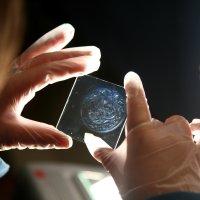
Making Holograms in your classroom!
Workshops are available for small groups of students (up to 15) - each student will make a hologram and learn about the light theory behind the process.
Please contact us for more details.
Particle Physics Activity: Cloud Chamber Making Workshop
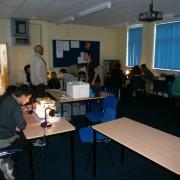
Cloud chambers are detectors used to make cosmic rays visible. Some decades ago these detectors were used at CERN in the first experiments to detect particles. This activity is based on a workshop designed by the Institute of Physics.
Groups of up to 5 students will make their own cloud chambers, observe particles and have an introductory talk on particle physics by a University of Southampton researcher. To book the workshop please contact Pearl John.
Astronomy Activity: The Hubble Constant Lab
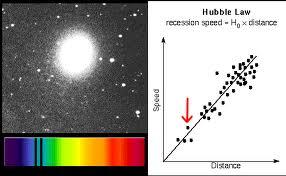
In this 'Lab' students measure how fast the Universe is expanding, how old it is, and the distance to some nearby galaxies. For more information contact Dr Sadie Jones.
Or book Dr Christian Knigge's talk about the Hubble Space Telescope Highlights: Amazing images and what they mean.
The Light Express Roadshow

The Light Express Roadshow is a free travelling roadshow which visits schools and colleges across the South of England.
It consists of a 'Christmas Lecture' style show which is very visual and interactive, initially aimed at AS/A Level Physics students, containing demonstrations and activities featuring the physics of light and the science behind the internet. The show links in with several units of the national curriculum and provides a unique opportunity for students to see high-powered lasers which are not generally found outside research labs.
Visit Light Express for bookings and to arrange a visit from the road show.
The Mobile Planetarium
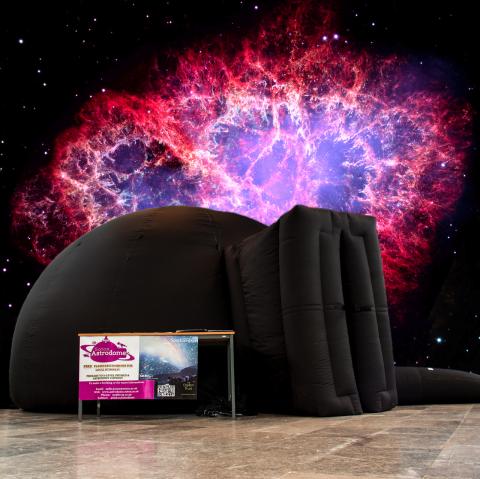
Interactive planetarium shows for AS/A-Level include discussion of the life cycle of stars, galaxies, black holes, Cephid variables, star types/temperatures, Hubbles Constant, dark matter and cosmology. Shows can be tailored to syllabus on request and all shows are presented by Astronomy undergraduates and PhD students. Please contact Dr Sadie Jones for more information or to make a booking.
Speakers for Schools
Many members of staff volunteer to give talks about topics in Physics and Astronomy at local schools. These visits involve no cost to the schools as the University is happy to cover all travel costs of the speaker.
Explore the full list of speakers.
An Introduction to Particle Physics by Nick Evans
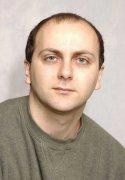
Professor Nick Evans
This talk introduces the main elements of modern particle physics including some of the more weird and wonderful concepts from quarks to neutrinos. Relativity and quantum theory link together to predict anti-particles. The quantum vacuum is a seething sea of appearing and disappearing particles.
Currently we are building the Large Hadron collider experiment to search for the Higgs boson a particle that provides all other particles with mass.
Activity: This talk can also form part of a larger afternoon or day- long activity involving a computer lab looking at real collider data.
Understanding Nothing: The Stucture of the Vaccuum

Professor Nick Evans
Surprisingly, investigations of empty space have played a major role in the development of physics. The talk traces these studies from Greek philosophy and the discovery of air in the Renaisasance through to their role in Relativity and Quantum theory. At the moment particle physicists are hoping to find the Higgs boson - a particle that fills space and provides all other matter with mass.
Cosmic Explosions, Dark Energy, and the Fate of the Universe
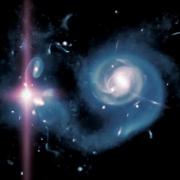
Dr Mark Sullivan
We live in a bizarre universe: a universe that is both expanding, and doing so at an ever faster rate. This acceleration apparently defies the slowing in the expansion rate expected from the gravitational attraction of stars and galaxies. Understanding this acceleration, and the "Dark Energy" that drives it, is one of the greatest scientific challenges of our age. We think that dark energy makes up about 75% of the energy / matter in the universe, but virtually nothing else is known about it.
I'll show how observations of distant cosmic explosions, called supernovae, can measure cosmic geometry and help to understand the nature of this mysterious dark energy.
Hungry Supermassive Black Holes
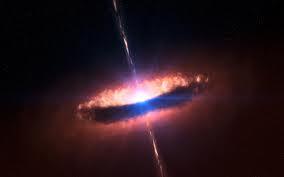
Dr Sadie Jones
Discussing two types of black holes; the stella mass and the supermassive, students will be introduced to Radio and X-Ray astronomy and how these approaches are used to understand jets from both types of Black Holes. The talk will focus on the supermassive black hole in the galaxy of NGC 4051 and its extreme environment.
Subject talks by Professor Ian McHardy
- Cosmology
- Galaxies
- The High Energy Universe
Explore the full range of talks available.
Work Experience
Please ask your students to contact us if they are interested in working in Physics and Astronomy at Southampton - we have a limited number of two-week placements available to students.
Visiting us
We are always happy to work with secondary school science teachers who would like to take a group of their students to our school. Such visits can provide students with a clearer understanding of what is involved in studying physics at the degree level and typically include a tour of our teaching and research facilities and some hands-on demonstrations. Visits can be arranged via our Schools Liaison Officer. (Note that these school visits are separate from, and in addition to, the visit days that we run for students who have already received a formal offer to study physics at Southampton.)